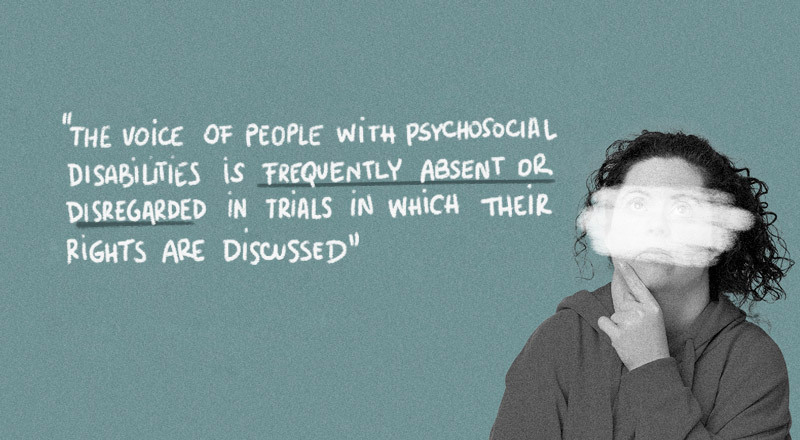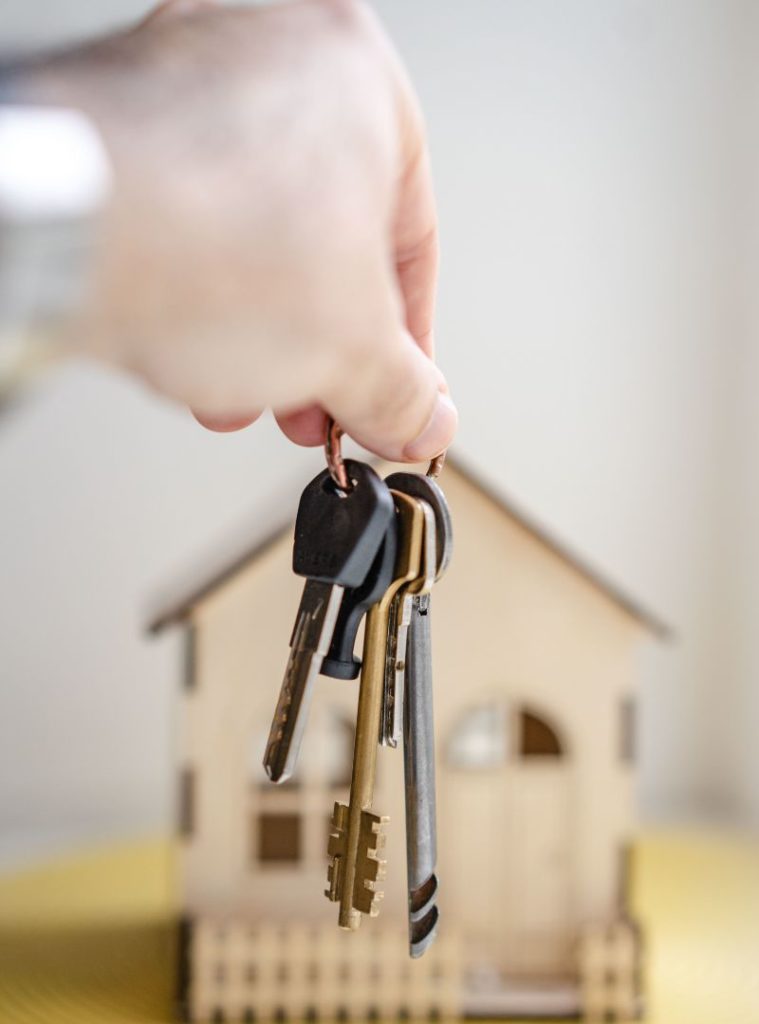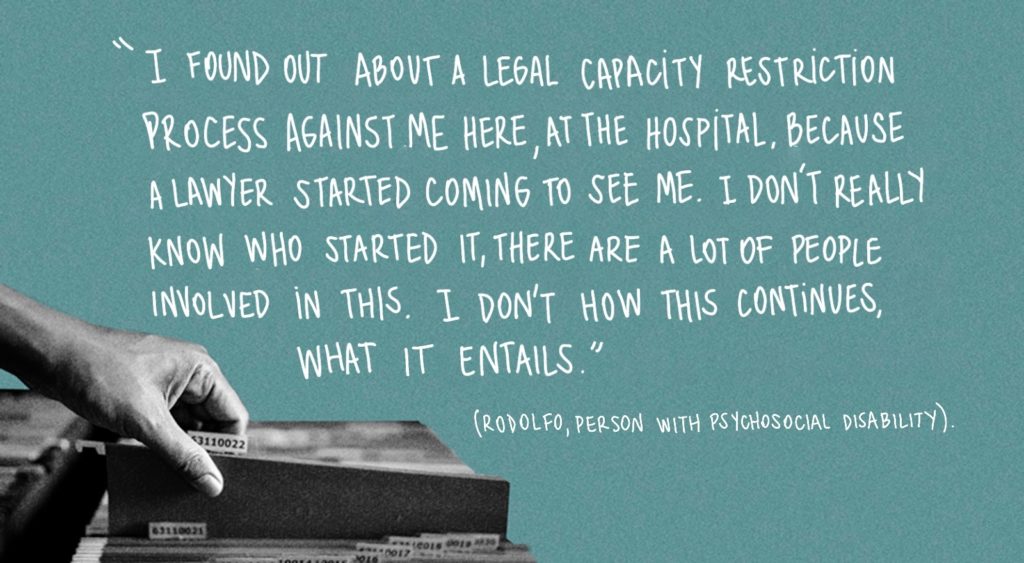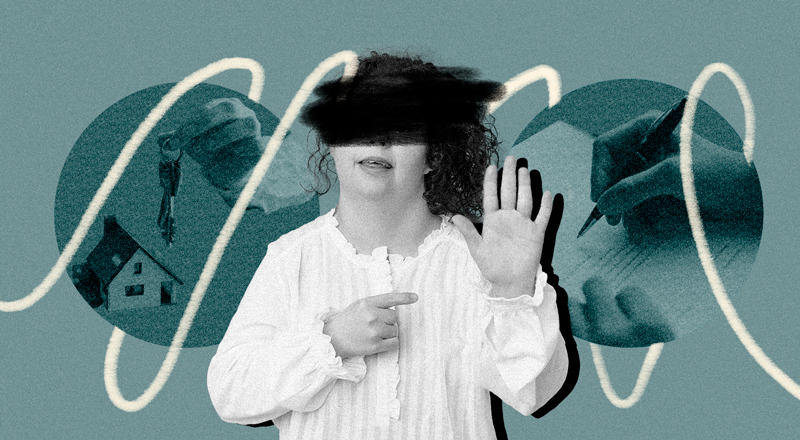“For many years my family has used my money, but I’ve never seen it spent on me. They do what they want and I am denied of any rights. My mom is the one who collects my pension, and I don't even know how much I'm going to collect next month. Sometimes she lies to me, she doesn't give me the money. At one time I was starving and my mom went on vacation and took the credit cards with her. When I said I wanted to talk to the judge about this situation, no one listened to me. I ask the universe to listen to me so that I can please manage my money“.
Juan* is 27 years old and has a psychosocial disability. For this reason, a judge designated his mother to be the one to exercise his patrimonial rights on his behalf, and that is why he does not have access to his pension. This is not the only right that he is unable to exercise. “I would like to live in a house, not in the hotel. I would like to improve, to have a green space. I don't like it where I am, the roof started falling apart last time, I almost got myself killed (...) The issue is that in order to change my address I will probably need my mom’s sign off. And I'm sure she won't be up for it".
Juan is only one amongst many of the people with disabilities who are deprived of the possibility to make their own life choices. ”Sometimes my aunt wants me to do things that I don't want to do, and it's hard to talk her out of them," says Nicolás. He is 38 years old, has an intellectual disability and a long list of things that he would have liked to do, but that wasn’t able to: “I would have loved to learn to drive. Or to pursue a career, but my aunt told me 'what are you going to do that for?' But in the end it’s me who’s putting his body on the line... I also would have wanted to get married or have children. Or, for example, choosing my clothes: sometimes my aunt picks them out for me, but that’s precisely what I’d like to do, to make those decisions for myself”.
Juan and Nicolás’ testimonies are part of an investigation by the Civil Association for Equality and Justice (ACIJ), soon to be published, which reflects the situation of several people with disabilities (especially intellectual or psychosocial): they see their legal capacity restricted against their own will, without being provided with the information and support necessary to exercise their rights.

Restriction of the legal capacity of people with disabilities: what does the Argentine laws say
To understand why some people are unable to exercise their rights, and they are assigned someone else to make life decisions for them, it is necessary to briefly review two documents.
The first one is the United Nations International Convention on the Rights of Persons with Disabilities, which Argentina approved with the sanction, in 2008, of the Law 26,378 . Its 12th article outlines that “States Parties shall recognize that persons with disabilities enjoy legal capacity on an equal basis with others in all aspects of life”. According to Celeste Fernández, an ACIJ lawyer specializing in disability issues, “this Convention seeks to move away from a system that replaces people, towards one that supports them in their decision-making and respects their wishes in all cases”.
At an internal level, since the sanction of the new Civil and Commercial Code of the Nation, in force since 2016, it is presumed that every person has the capacity to exercise their rights.
“Before the Code was updated, the system was binary: you were either capable or incapable. With the new code, the person is presumed capable. And in the event of legal capacity restrictions, it anticipates that support services must be appointed”, analyzes Fernández.
Support is, according to the code, "any measure of a judicial or extrajudicial nature that makes it easier to the person who needs it to make decisions to direct themselves, manage their assets and celebrate legal acts in general". In these processes on legal capacity, the support is usually a person. And “(they) must promote autonomy and ease the communication, the understanding and the manifestation of the person’s will to enable the exercise of their rights”.
Support can come both from relatives or people close to the person with disabilities, as well as private or public lawyers (their formal name is "curator public defenders", although their’s is a support-providing role, not a curating one).
The Code contemplates the restriction of legal capacity and the appointment of support services and —only in exceptional cases in which the person cannot express his will in any way— the declaration of incapacity and the appointment of a curator. In addition, it indicates that sentences must be reviewed whenever requested by the interested person, or at least every three years.
In practice, only part of this happens.

Although Fernández points out that the new Civil and Commercial Code constitutes a step forward when compared to the previous legislation, he also warns of potential complications in its execution: not only the person with a disability can initiate these processes, but both family members and the Public Ministry can request a trial to restrict their legal capacity as well.
“This means that many people with disabilities undergo processes against their will. If support services are a person's right, only they should be able to ask for them. Enabling others to request the start of these trials shows that they are still intended as capacity-restriction processes, and not meant to accommodate their need for support services”, Fernández clarifies.
“The voice of people with psychosocial disabilities is frequently absent or dismissed in trials where their situation and their rights are discussed. The margins for them to express their will are scarce”, assures an investigation by the Center for Legal and Social Studies (CELS) which, although targeted to people admitted to hospitals or psychiatric clinics, is applicable to several people with disabilities who live outside these institutions.
“Although formally speaking the sentences speak to the need for support, in fact rights continue to be restricted, and for various reasons, among which is the lack of knowledge on how to implement support in accordance with the Convention. The person designated as support, in most cases, ends up substituting the person with a disability in decision-making, instead of assisting them and respecting their will”, considers Fernández.
“These processes should be initiated voluntarily by the person with a disability, and they should be listened to at all times. For example, they can decide to forgo any support services, or decide to designate a person they trust more, and that must always be respected”, the lawyer adds.

Why are trials for legal capacity restriction initiated
The ACIJ report highlights that, according to the Legal Team of the National Directorate of Mental Health and Addictions, the requests to determine legal capacity usually begin with “the need to carry out acts or procedures linked to social security benefits, assistance or health coverage (21%), assets management (9.86%) or as a result of institutionalization (23.62%)”. A civil judge goes further: he says that “90-95% of the procedures are initiated in order to manage and collect a pension or retirement”.
Sometimes, family members initiate these processes out of ignorance, because they believe that the person needs them, but against their will or without them being consulted. And without fully understanding that the autonomy of the person in question, and the full exercise of their rights, should be the ultimate goal.
At times, government agencies and health insurance companies require that these judicial processes be initiated in order to carry out certain procedures. “Front desk staff at public and private organizations are not sufficiently trained. We live in a very judgemental society: when our prejudice tells us that a person with disabilities can’t make good decisions, we demand more from them”, explains a curator public defender quoted by ACIJ.

There are also situations of restriction of legal capacity linked to the institutionalization of people. “If hospitalization is sustained, generally due to social issues and failures in the health system, it is assumed that the person is not capable of making the 'appropriate' decisions for their life and therefore it is necessary for a third party to decide for them”, the National Directorate of Mental Health and Addictions states, in a quote from the ACIJ investigation. And they also warn this can initiate a vicious circle: the system itself causes the restriction and then the restriction prevents people from leaving that situation and living in freedom.
At the same time, people with disabilities are often not well informed about these processes. “32% of those interviewed do not know if they are linked to a process to determine their legal capacity”, says the CELS research cited. And it also points out that “of the people who reported being aware of the existence of a judicial process restricting their legal capacity, only 4.4% said they knew the judge in charge and 20% reported not knowing their appointed curator”. Along these lines, Rodolfo, a 60-year-old man with a disability, interviewed by ACIJ, recounted: “I found out about the legal capacity restriction process against me here, at the hospital, because a lawyer started coming to see me. I don't really know who started it, there are a lot of people involved in this. I don't know how this continues, what it entails”.
Support services that do not provide support
In practice, support services that should help the person with a disability exercise their rights according to their will often restrict them. And this is due to different factors.
On the one hand, sometimes these support services are public defenders. But they are simultaneously supporting 200, 300 and even 500 people. “When many times it's said that support has to be more personalized, I say that this should be paired with more resources, because there’s about 350 people we assist and represent, and the truth is that it is impossible to do it”, says a public defender.
In Buenos Aires city there are about 20 curator public defenders, who in 2020 assisted 11,051 people (the number is more than 500 people for each support).
Having someone familiar and trustworthy as a support provider is key. But there are also problems when the support comes from a relative. Some family members don't know how to interact with the person and don't understand what it means to be a support. “I don't know of any document that teaches how to provide support, that helps me carry out the role, that can give me solutions to these questions I’m asking myself about my daughter's future”, claims a person who performs that role.
On the other hand, many people with disabilities perceive support as authority, not as help. “All of my choices have to be vetted because I was declared insane, I have to explain my support the reasons why I want to do such a thing. If he agrees, it is done, if he does not agree, it is not done”, says Miguel, 59 years old and with a psychosocial disability.
It also happens that both the judges and those who work as a support, limit the decision-making rights thinking this is a way to protect a person with disabilities. “There is a right to make mistakes and to assume the risk of one's own mistakes. That is what living is about,” Fernández considers.
This happens in many areas. For example, during legal processes that restrict political rights, there are judges who ask the person if he is aware of who the candidates are, or why they would vote for this or that person.
In regard to a person with disabilities having their right to manage their assets taken by their support provider, CELS points out: “There is a question of 'I am going to do things in such a way that you do not lose what you have.' But what if they want to lose it, knowing what the value of money is? The stakes are high. Because one part has to be open to the possibility of the other to get confused, make a mistake, and effectively lose it. But they are not going to lose it for not understanding the value of the exchange with objects through money”.
As a result of a diagnosis in the mental health field, Alejandra has had her legal capacity restricted for many years. “My curator did not like what I used to buy. I wanted to buy an extractor fan for the kitchen, and she told me that I was not going to use it, that it was useless. I'm not saying I can't make a mistake, but if I can't make a mistake with my own house… That disqualifies me as an independent person,” she says. Later, she managed to get a different curator assigned. Today, her support is a person with whom she has an affinity. “It's totally different,” she says. But she admits that the process of changing support often involves a lot of paperwork.

A global problem and the need for a cultural change
Fernández clarifies that the problems discussed in this article are not exclusive to Argentina, but are very present in Latin America and other parts of the world.
Recently, Spain passed a law that prevents judicial incapacitation.
In the region, the Colombian law is a role model: there, the law provides that judicial processes for support allocation can only be initiated by the person in question.
In that country, the law had been appealed twice under claims of unconstitutionality, but was finally confirmed by the Constitutional Court.
“Colombia made significant legislative progress, but there are still challenges ahead. Now the challenge is to apply the law in the facts, which implies training lawyers, judges and notaries. Legislative modification is a first step, but there is a profound cultural change, consisting of breaking the paternalistic vision, and for that, awareness must be brought to the families as well,” says Fernández, who emphasizes that this cultural change must also take place in Argentina.
For CELS, “sustained and mandatory training programs for judicial operators in relation to the decision-making support model” are necessary.
Another existing prejudice is that people with disabilities are considered reckless. For this reason, for example, rights associated with family life, such as getting married or having children, are restricted. A public defender quoted by ACIJ says that there are judicial processes in which, to assess a person's right to getting married, “they even summon the person’s partner”.
Fernández adds that, when it comes to parenting, judges do not usually contemplate that a support can help a person with a disability to exercise motherhood or fatherhood, but rather consider that their diagnoses disqualify them from exercising parental authority. Thus, they restrict rights, reproducing a pathologizing scheme that’s incompatible with the social model of disability.
There are judges who have endorsed forced sterilizations on women with disabilities or decided to give the children of people with a mental health diagnosis up for adoption (the latter is something very common in institutionalized people).
A document published by the Network for the Rights of Persons with Disabilities (REDI) and CELS highlights that, according to the Committee on the Rights of Persons with Disabilities of the UN, the body authorized to interpret the Convention, the designation of support services “should not be used as a justification to limit other fundamental rights for persons with disabilities, especially the right to vote, the right to marry or establish a civil union, found a family, reproductive rights, parental authority, informed consent, right to freedom”. Perhaps those of us who enjoy the full exercise of our rights, the possibility to decide for ourselves, do not realize how much we have. We may not stop to think about what Alejandra, whose testimony we recounted above, summarizes simply but profoundly: “Making my own decisions means a lot. It means having freedom, joy”.
*The testimonies extracted from the ACIJ investigation use fictitious names.
This article was originally published in Spanish under the title "I ask the universe to listen to me so I can manage my money."
You can read this content thanks to hundreds of readers who support our human journalism with their monthly support 





